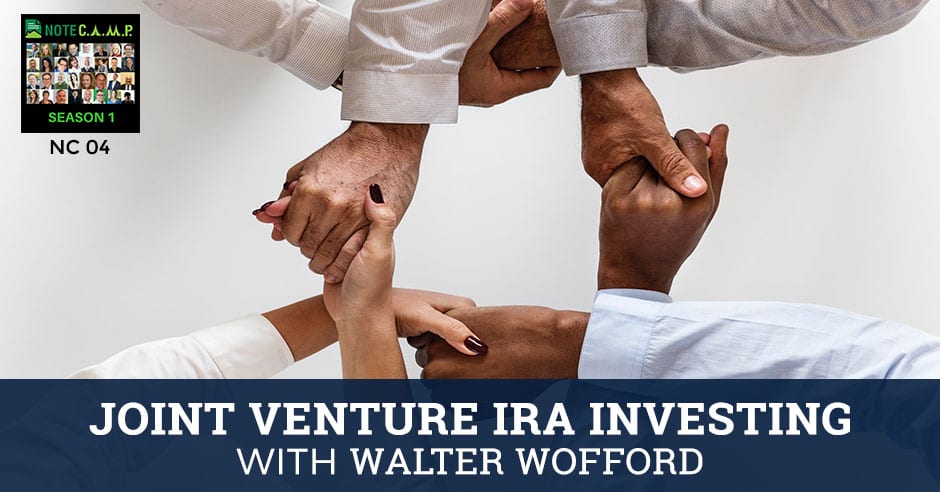
For companies going for a more efficient scaling route, they go into joint ventures. This allows them to combine assets and operations as they share the risks as well gaining access to the skills and capabilities of each JV partner. Walter Wofford explains why it is harder to go bankrupt in joint venture IRA investing because of the opportunities each one brings to other. He shares that as a real estate investor, you are both a deal maker and a deal funder, but you have to understand that deals go better when you can control it from the money standpoint. This way you can limit your downside while you increase your upside.
Listen to the podcast here:
Joint Venture IRA Investing with Walter Wofford
We’re excited here, kicking off with our good buddy join us all the way from Mississippi, the IRA dealmaker, Mr. Walter Wofford. You bring in some love from the love shack for everybody?
I hadn’t been out there in a week or so, but it’s because it’s being rented through Airbnb.
We’re glad to have you for the first time on Note CAMP, Walter.
Thank you, Scott. You added such a great experience level when you came on the cruise recently, so I appreciate you participating in what we do.
Hopefully, you talk a little bit about what’s up with FFN network.
We’ll talk about it. We’re booking one for May of 2019 will be the next one. We hadn’t finalized that yet, but we’re going to Cuba. I went to the corner bakery and spent about three hours on this presentation.
That’s a good thing. You don’t have to be good typo or good penmanship to be a real estate investor.
You need to be a good negotiator though. You know I’m not giving any tax, legal or financial advice. I’m just telling you what I do in our little community in Jackson, Mississippi, which is the state capital, and that’s the only place that I do business. I’ll tell you more about what we do. Our topic though is about joint venture IRA investing for real estate and notes. I’m going to get a little philosophical on you, Scott. It’s really about a way of life of joint venturing. Let me tell you about me. I’m old. I’ve been doing real estate for 36 years in Jackson, Mississippi. I’m living about a half a mile from where I went to college and I’ve lived in this neighborhood called Belhaven most of my adult life. We know people here. We can’t walk down the street without knowing people and I liked that. I’m married for 42 years, coming up this June and got three great kids. Two of them are married and the two boys are in real estate here in town. They got their own operation and we do different things. I’m more in the affordable housing space. They do management, each of them, and brokerage. You can imagine what we talk about around the dining room table. We often have family business power breakfasts and we hold each other accountable and we know what each other is doing. That’s pretty good to know what the business is, the family business, like the Godfather. I’m going to ask you philosophically. Would you rather have all of the deal or a piece of the deal?
I’d rather have a piece of the deal instead of all the deal sometimes because I’m a big believer that I can leverage my funds better if I get a piece of it or if I’m leveraging my time to get a lot more pieces of multiple pies versus just one pie.
I’m the same way. I’ve realized that real estate is a team sport and of course you know that too. I’ve done all the carrying the weight of debt and changes in the market on my shoulders. I don’t want to carry those anymore, so this is a mindset for you. I started out in the wholesale business letting somebody put the money up, I close on it and then sell it, they’d get their money back and we’d split the profits. That’s how I started 36 years ago and I still think it’s a good model. It’s hard to go broke that way. I always start my talks with Wikipedia. I want to know what they got to say about whatever I’m talking about. A joint venture is a business entity created by two or more parties generally characterized by shared ownership, shared returns and risks and shared governance. That’s a pretty good definition of it. Companies typically pursue joint ventures to gain scale efficiencies by combining assets and operations to share the risk, that’s what I’m talking about, or to access skills and capabilities. The topic of this is joint venture IRA investing, so I went to Mr. Wikipedia and I say, “What do they say about IRA investing?” and the page IRA investing does not exist. Maybe we need to wake Wikipedia up. I’ll tell you who knows about this is GoDaddy. Who wants to buy that domain?

Joint Venture IRA Investing: Joint venturing is a way of life and business, limiting your downside while increasing your upside.
Going back to that definition to gain scale efficiencies by combining assets and operations to share risks or to access skills and capabilities, and I’d add one more thing. To net it out, one party brings the opportunity to another and they may not need each other, but it’s harder to go broke joint venturing. You can do the deal by yourself, easier to go broke that way. It’s sharing upside and sharing downside, and this gray hair that I have earned it by not realizing that it’s better to share both the up and down. We’re going to talk about what that with IRAs too. Here’s another question for you, “Would you rather be a deal provider or a deal funder?”
There are times I’m both actually. I would probably rather be a deal provider because then I got plenty of people out there that can fund the deals. We fund enough deals now but initially getting started, I had to be a deal provider because I didn’t have the funds.
We do wear both hats, but which do you think you can leverage more? Being a deal provider or a funder?
A deal provider.
I don’t think so. I think you can get your fingers in a lot more pieces in pies if you’re on the money side of the transaction.
Philosophically, it’s great because there’s no right or wrong to that aspect of things.
Which one is more important?
You’ve got to have the funder, exactly.
The most valuable line item on your personal balance sheet isn’t written down and you know that. You’re a master at this networking piece. You’re everywhere. I can’t go and turn on my computer without having you looking at me. The network is very valuable and it takes time to create a network. It is one-on-one face time, sitting around, traveling together, drinking together and finding out what somebody else needs and be a provider of some type. I made two offers today, so I’m a deal provider, but I’d rather control it from the money standpoint. That’s just me. Joint venturing is a way of life and business, limiting your downside, while increasing your upside. Think of it as options. You like dealing with options better than ownership?
I don’t know. It varies. It depends on the deal. I like the option if I can’t guarantee ownership. The option easily entitles me to the ownership later on.
It has to do with your market and what you think about the future. As a sidebar, Netflix has got a documentary on Donald Trump and the real estate, starting when he was age 27, making deals with the City of New York for that first Commodore Hotel they bought, I highly recommend it. It’s awesome from a real estate standpoint. Let me just give you philosophically how it becomes a way of life for me. We had an event in Jackson that’s in my backyard and I hired this musician who’s also a real estate investor. I said, “Joseph, how much are you going to charge?” He said “$250 for the night.” That’s the right number, but I said, “Let me see if I can do a joint venture with you. When you get through playing, your time’s up, call me up there. If I can get you more money where you play longer?” I’m going to call people up and put tips in the jar, and then you get to keep whatever it is.” You see how I’ve limited my downside having to write that $250 bill, but he gets upside by playing along. You do joint ventures every minute all the time. He got way more money than $250 because he got the women up there dancing. That’s just a philosophical thing.
What is a real JV deal? Here’s one that we did and it turned out well. I’m not going to tell you about all the things that didn’t turn out well, that wouldn’t serve a purpose, but this one did. You’ve got the deal provider and the deal funder. There are always more parties to executing a deal than just those two. You probably have another ten or fifteen people involved to make it happen with the closing attorney, insurance agent, and all that stuff, and then you got to have the documents to make sure there’s an understanding among the parties and between the two primaries. I got a call while I was on the cruise in September to Seattle from one of my local allies who is actually a closing attorney. As a matter of fact, I got the call sitting at the bar with Quincy and there’s my wife and there’s his wife, so this is real time, real deal, it happened. I pulled off my phone and I showed him a contract that I’ve negotiated while we’re at sea. It was this house in a nice area of northeast Jackson. It was a five-bedroom, three-bath house that needed about $40,000 of work, and it was assessed for $160,000. It had a pool that I was afraid to pull the tarp off of. I didn’t want this house. I just wanted the money.
I like to tell the story about the sardines. A guy bought a box of sardines for a dollar and sells it to the next guy for $2. The next one sells it to the next guy for $3 and then another buys it for $4 and for $5. He looks at that $5 box of sardines and said, “Those must be good.” He opened the box, started eating it and spit it out. He went back to the guy that sold him the sardines and said, “Why did you sell me these rotten sardines?” He said, “No, you got it all wrong. Those were trading sardines, not eating sardines.” This house, what do you think? Is this eating sardine or trading sardine? A trading sardine.
Yes, definitely trading with that much stuff that you need to get done, even though with a pool.
I knew that I didn’t want to own this for very long, so I showed the contract to Quincy while he was sitting across the bar. You can see his greed glands just getting bigger and bigger that his neck swelled up and chokes off your blood to the brain. What we did is we made a deal and I said, “You put up $50,000, I will put up $5,000,” and we bought it for $55,000. We actually closed on it. We had to have $2,000 to remove the freak, trim it up, get all the junk out of the house, that sort of thing, so we can decide what to do. This is a classic joint venturing. Somebody provides a deal, somebody provides most of the money. It looks something like this. You’ve got to come up with multiple exit plans when you do. Purchase it for $55,000, freak removal for $2,000, list it for $99,000. We’ve got three hedge funds buying in town and they don’t mind tackling this. They actually bought it as a rental. That doesn’t fit my rental, but they think they can rent it for $1,750 a month and maybe they can.

Joint Venture IRA Investing: When you’re entering into a joint venture, most of the time you don’t know how it’s going to end.
My son who’s an agent listed it for $99,000. We cleaned it out. Within a week, we had a hedge fund offer $92,000 and we accepted it. If they had not done that, then we would have bought it for $55,000, total rehabbed it, and listed it for $159,000, and that would have worked too. I had two ways I could go on that. Often when you’re entering into a joint venture, most of the time you don’t know how it’s going to end because market conditions dictate. I got home inspection and I knew what they thought was wrong with the house, but there’s always more wrong to a house. This is how we do it. Virtually every transaction we’re going to take title and trust. I’m a big believer in the trust and so it was owned by the two parties, 50/50, but doesn’t reflect what the deal is. That’s just ownership. We had to have a separate agreement; we had to have a joint venture agreement. It said the contributors get first money back, so I got $5,000, and he got $50,000, and then we split 50/50 profit. That’s a classic joint venture structure, but adding the trust gave us some flexibilities and then we had to spell out who gets the money and anticipate what happens. There might be a capital call if we got to fix it up, we just didn’t know, but we sold it within 30 days. That’s a pretty good way to do it. It’s an example of a JV for a trust owned by IRAs. They’re both tax-free, Walter IRA and Quincy qualified plan. In that sale, it is not a taxable event. If they are owned by IRAs, is it a taxable event? No, so it worked out just fine. What you got to do when you got somebody’s money and profit, you got to roll it into the next deal. You can’t give it back to them right away. You got to work and find another deal and that’s what we did too. This is an example of a JV for a trust owned by IRAs and for real estate.
What about a JV on a trust that owns a note or option? This might be a similar type of trust that we use, but I like using trust for owning notes, options, and lending. A different kind of trust but similar parties. I got the call from a tired landlord and he says, “The tenant has been there six years. They’ve been paying for $450 a month. It’s a two-bedroom and I want to sell that house to you and then you finance it to the tenant.” He didn’t want to finance it to the tenant because he didn’t know how to do it. He just had one exit. I looked at the house and I talked to the tenant and we took them through the qualification for Dodd Frank and she qualified in every way. We decided we’ll do this to you, and so it looks like this. The opportunity is purchase from a tired landlord for $18,000 and the tenant wants to buy with financing $28,000 with one down and 72 payments and then that equals all in $450 and that’s at 8% note. That’s affordable housing. Very likely this lady would never own a house if it wasn’t for something like that. How would a joint venture own this deal? Let’s have the presumption that I want to use somebody else’s money for every deal. That’s not always true, but let’s say that is. How would you structure that as a joint venture?
Pretty similar to how you structured the last one, have the investor come in, fund the deal with maybe a little bit of extra for repairs, things like that, and then do the same thing. They get their money back and then split the profit, either 50/50, how you want to do the percentage on either the payment stream or an option to be paid off early.
It’s a blank slate. We can do it any way that you and I can agree to do it. We’ll put an IRA buying it from the tired landlord interest, so the IRA will fund the trust and the trust will take title. Later on, it could be six months or a year. If you have a questionable homeowner or one that hadn’t proven themselves, rent it to them for a year or two and then sell it on those terms. It doesn’t have to be an immediate sale because the income would be the same, wouldn’t it? It’s exactly the same. The IRA buys it in trust and then somewhere down the road sells it to the homeowner with seller financing. After the sale transaction is complete, you sell a percentage of the trust that owns 100% of the note. Let’s say it was my IRA that puts the money up, so I’ve got the return on my money. Then we sell it to the homeowner carrying back a note, but the trust converted an asset of owning real estate to owning a note. The trust didn’t change, the asset changed, and you can go to the Quest site and see that all the time that it’s a very common thing to convert an asset.
If I wanted to get my money back, then I could sell a %age of the trust that owns 100% of the note. Would this work? I can sell for 18,000, just about $18,000 into $27,000. Remember the $27,000 was the note and so I could sell 66.67% of the trust for $18,000 that owns 100% of the note. Could that work? That’s a joint venture type arrangement. I’m happy getting a third of the payments because all my profit was created. If it’ll work for a small deal like that, do you think will it work for a bigger deal? Yes. These two deals are just the deals of the week, so I will always pull some fresh stuff. What would the parties receive? You’d have an assignment of a beneficial interest in the trust. Let’s say that I bought it in my IRA and then I’m going to sell you 2/3, so you would receive an assignment of the trust, ownership of the trust, but the income then we’ll come in and be split out 2/3 and 1/3. You say, “A third of $27,000 isn’t much” but just add zero to it and put it in your market and it is much and it’s all tax-free.
Have you run across this term? Impact investor. This impact investing refers to investments made into companies, organizations, and funds with the intention to generate a measurable beneficial social or environmental impact alongside financial return. You see these, “This company is green” or they’re doing this and it’s solar and all that stuff. It’s talking about the investments that you can measure the effect of this investment. There are many: Bill Gates, you’ve got Sir Richard Branson’s got a worldwide impact investing. A lot of people that have wealth want to do good and make a return. The impact investors actively seek to place capital in businesses or non-profits with the funds in industries such as renewable energy, basic services including housing, healthcare, education, micro-finance, and that might be microfinance that we are doing there, and sustainable agriculture.

Joint Venture IRA Investing: If you’re going to play in that band, go for the higher amount. Go for more down payment.
What we do in Jackson is a joint venture with retirement account owners to create tax-free notes for cash flow as an impact investor with affordable housing in Jackson only. We’ve got a lot of suburbs that I don’t want to do this in because they don’t need my help. I wanted to give back something to the real estate community and I’m dealing with C and B-minus neighborhoods. It’s easy to buy a tenanted house that a tenant might be paying $800. In our market, I’m thinking about a specific one that I bought for $27,000. I would go to the tenant and say, “How would you like to own this? I can make your payments $200 less than what you’re paying and you can own the house. We require down payment and the Dodd Frank compliance and all that.” You see what it’s doing; it’s making an impact because I think homeownership rather than renters does more for the community, and I think it will be measurable.
You always have somebody who has a better pride of ownership because they actually own the property versus rental aspect. We’re seeing a lot of that in Memphis where it’s 85% rental community and they’re having blithe across the whole city almost block by block places because it is such a big rental market versus owner market.
How would you change that? Unless you go proactively after this, you’re not going to change it.
The only way to change it is on asset by asset basis like you’re doing, going out and maybe changing it from a rental mindset, “We’ll offer financing for you. We will give you a hand up.” We see a lot of that going on in the neighborhoods of Chicago, especially the rougher ends where all the gangs have been taking over. The community is re-gentrifying and they’re fighting back neighborhood by neighborhood, street by street, house by house in a lot of cases.
It starts with some leadership or a vision but implementing it. I can’t in my remaining career life make the impact by myself. I need a team. I need to sell the dream to somebody else, and of course, we can make some money doing it too. I used to call myself an accidental do-gooder and that was true, but it doesn’t sell like an impact investor. It’s just the same thing. I use exclusively IRA money. It’s easier to deal with because of the nonprofit status of IRAs, non‑taxable. Let me just give you a couple that we do. Our price range in the affordable house band is anywhere from $20,000 to $65.000. There are no institutional lenders that will make a loan in these neighborhoods less than $50,000, because you’re not going to make $20,000. Why? Because Dodd Frank took away the financial incentives for the companies, the mortgage brokers, they can’t make any money. If I’m going to sell a house for $20,000, that means I got to buy it for about $10,000 to $12,000. If I’m going to sell that at $65,000, then I don’t need to have more than $40,000 in it, so I’m asking you, Scott, which end of the spectrum would you rather play in?
The $20,000 market, you have a lot of people who can bring cash to the table to finance you off there. Like you said, banks are not going to do a finance on that aspect, but the $65,000 gives you a lot of flexibility or buying it cheap enough that you can carry financing and get some down payment on that aspect and owner finance it in a variety of ways. I like the lower side. I’m not a big fan of anything over $100,000 to $150,000 for the most part because I like the options and the ROI for the lower balance stuff.
If you had to take them back, which would you rather have?
I’d rather have something in the $60,000 range or less for the most part. They’re so much easier to move.
My advisor said if you’re going to play in that band, go for the higher amount, go for more down payment because you’re sure the $20,000s do improve the neighborhood, but the $65,000 is a safer place to be.
You’ve got to replace the air conditioning and it’s less percentage of the house than 25% of the total profit on a $20,000 asset.
I have a lean organization. Not that I’m lean; my organization is lean. I try to build processes and it’s very hard thing to do for me. I got tired of answering the phone. My phone has rung four times in the last five minutes. I’m just a small operator, and so to put systems in place is critical for me. That’s our sign, it’s a good-looking sign, and I drive them to the site. There is no phone number on it. When they go to Improving Jackson, I took the time to tell people how they can be qualified. If they know they can’t be qualified, then they’re wasting my time. Both my sons are property managers and I asked them “How much of your staff’s time is wasted showing prospective home owners or tenants houses that don’t qualify?” The immediate answer was “90% of my staff’s time.” I don’t have that staff. I can’t do that.
If they can’t follow directions, they’re not going to get a house from me. They go there and there is a video that tells them what to do and we’ll use Podio to process it and virtual assistants and the like, but we don’t show them houses. We’re selling the dream of homeownership, not a particular house. “I want to see your houses.” “I’m sorry you can’t see my houses. I don’t have time to go show you a house unless you get qualified.” “How do I get qualified?” “Go watch the video.” “You mean I got to watch a twenty-minute video?” “Only if you want a house.” It’s pretty good. It’s a mindset thing and it works. We’re selling one house a week to homeowners and we get one application a day. That’s enough, isn’t it?
Yes, it is. That’s 30 a month, five houses a week. That will keep you busy.
My volume, I don’t want to do five houses a week. I want to do one a week. What I want is show you how you can come in my market and do one that’s leveraging it. If you come to town, I’m going to figure out a way to get my hand in your pocket. I will sell you something or I can do some service, but as long as it’s going down this mission-minded road, if you’re coming here to buy rental property, I’m not going to sell to you. That’s stupid, I know, but that’s not part of what I’m trying to do. I’m not trying to get more rentals; I’m trying to get less rental in three specific zip codes. I’m not working all over town. I pick the ones that have the highest percentage of renters. In Mississippi, the statewide percentage per zip code is about a third are renters and these neighborhoods are as high as 2/3. I’m not going to the neighborhoods that don’t need it. I’m being very deliberate about that.
To give you an example, this is a three-bedroom, two baths with central air and heat, and their payment is $658, that’s all in, taxes and insurance, nice house. We bought that from an estate. I paid $34,000 and sold it for $65,000 something like that. I spent about $1,000 on it. That was a homeowner that was in there that had that particular house with a rent for a $1,000 month. The question is “Why would you give up the cash flow renting for $1,000?” I’m telling you I’m going to make more money doing this and you will rent the house if the market stays stable. You could make a case that if it’s an increasing market, it’s better to own it. I’m 64 almost and what I want to do is build these monthly income streams tax-free to take me and my wife out the remainder of my life and I hope that the income stream will last longer than we do. That’s the goal. Think about doing one a week and ending up with a third of the note. That’s pretty good cashflow. We do them in retirement accounts. There’s not even any reporting the sale. You don’t have a place to report the sale.

Joint Venture IRA Investing: You’ve got to be able to take advantage of what opportunities come your way.
There’s another one that was really interesting. That house was on the market a realtor had listed for $80,000 and it was an estate property. The only thing the realtor knew how to do was just keep lowering the price, so they lowered it to $60,000 no action for two years trying to sell this house, lowered it, lowered it, so I went in and made a cash offer of $20,000 and they accepted it. Then I had somebody ready to move in. We didn’t spend one dime on that house and did not do one repair and sold it for $43,500. That’s what I’m talking about improving the community. The guy that was living there was actually medically disabled. He was in a car wreck and he has a job, but he’s also medically disabled. I called him up one day and I said, “If you own a house in Mississippi, you don’t pay property taxes if you’re medically disabled.” They get enough check that they don’t have to work, but he chooses to work and they’re taking them off the tax roll. You might say, “That’s counterproductive to the government structure,” but that’s the laws of Mississippi. I can’t tell when somebody is medically disabled; the obvious you can but not always. Here’s the two-bedroom, two‑bath house, $528 a payment, nice house. We didn’t do anything with that house either and they were over 65 when they bought it. That’s also a trigger to get off the tax rolls here in terms of paying for the taxes.
On other states, there is a homestead exemption or things like that too, right?
Right. They own it and live in it and they were over 65. I sold that a couple of years ago. The husband died. She’s there, she has an affordable house that can take her out through the remainder of her life but she would not because that’s an $800 rent, probably $750, but look at what lacks her payment, $528. Here’s another one. We were looking down the roof putting up the Christmas lights when we took that, but that was 1,500 square-foot house. We bought it straight off the MLS. It was a VA foreclosure for $17,000. We fixed it up, spent about $10,000 or $12,000 on it and we sold it for $58,000 or something like that, but we provided financing. What’s interesting about that house is the owner of that house approached me and said, “I’m a painter. I want to come to work for you.” I said, “Fine.” What I intentionally do is my borrowers and their family members, I want to work them. He’s painting a house for me, so it doesn’t make sense that I’m creating a micro‑economy for the borrowers and their family members. I interview to find out what skills they got in the area that I’m interested in. See how that builds up the community? I said, “Do you have somebody else that needs a job painting? We got some more jobs. Can you train them? Do you know how to train somebody?” “Yes, I can train somebody.” We’re creating a craft-oriented situation.
Here’s another one. We bought that from a wholesaler for $24,000. It’s a three-bedroom, two-bath house and the tenants that were in there were paying $815 a month. Whenever we got to do a repair on my house, my repair guys are trained to peck on and say “Walter will finance his house for you,” so I got my workers doing the sales job. They called me up just before Christmas and said “We’re ready to buy the house.” “Do you get the down payment?” “We’ve got some down payment.” “Good. Your payment’s going to be $658, and will put her on a 15-year 8% loan,” and they own it.
You never deal with vacancies. You’re also not dealing with any of the repairs because now they’re the owners and they’re the ones making the repairs to the property as well.
I’ll make more money doing this than I will renting it. Fix it up between tenants, not good, not to mention the vandalism. This one is one of the first ones we did. It’s good to have flexibility. This lady called me off my car signs and said, “I want to stay in my house.” The owner of this had been there for many, many years and her husband died, she had to go move in with her sister in another city. I went over there and I said, “What we’re going to do is we’re going to sell this house with financing.” I’ve got a certain criteria that works and your house may not work, but I wanted to tell you what I’m going to do with it. I said “I’m going to find somebody that will give me $3,500 down and I’m going to sell this house for $43,500, as a short payment as I can,” so I’m telling the owner what I can do. I said, “I’ll help you do this. If you need help, I’ll walk you through it and I won’t even charge you anything for it if you’ll do this for the community, but we’re going to put a homeowner in here,” and her face just lit up. She says, “My neighbors across the street, all we talk about is who’s going to buy this house, and how are they going to put some renters in there?”
It’s a real concern for the people left behind of renters coming in. What does a typical landlord do? They put HUD tenant in there. That’s a loser’s game in terms of ever selling it to them. They’d been paying almost five years on that note and they said, “We want to move out to the country.” I said, “If I had a house in the country, I’ll sell it to you but I didn’t have a house in the country.” They said, “Will you take the house back?” I typed up a deed, emailed it to them, they got it notarized, so I released them of the debt and they’re still in the house, but until they’re ready to go, they’re just now renters. I’ll turn around and probably sell that house to the hedge fund. The reason I would make the exception about a hedge fund is they’re really spending money on these houses. They spend an average of $25,000, so they’re improving Jackson too but they’re doing it for different purposes.
They’ve also got very cheap money too behind them and they’re paying usually a little higher price on them because they got the cheaper money outbidding the competition.
That’s certainly been my experience, but they’re pretty picky about what they buy. If there’s an abandoned house, they’re not going to buy, that sort of thing.
We got some great questions here from people. “Do you tailor a new joint venture for each agreement or is there a custom template that you use with predefined terms?”
I would say tailored to the needs. If it fits the model of what I’m doing with affordable housing, it’s templated. Not every opportunity do I use a template, so you’ve got to be able to take advantage of what opportunities come your way.
Also the negotiations; there are some things you can negotiate better on than you can on other things. We get that when people, “You’ve got JV agreements?” My JV agreements are different for each asset a little bit and each investor. The best thing you can do is sit down and talk about what you want to do, put it on paper, or have a real estate attorney draw it up for you and tweak it from that point going forward. Why are you using a trust and not an LLC, Walter?

Joint Venture IRA Investing: Trust doesn’t give you asset protection than an LLC does.
There are lots of reasons for that. Trust doesn’t give you asset protection than an LLC does. It protects the owner but not the asset. The LLC can still lose it, but one very good reason is I like trust because nobody understands it. I really like it for that. I had a meeting with a builder here in town and he owns a rental property. He said, “I’ve heard you talk about these trust, tell me why.” That’s the same question. I said, “How many properties you got in your one LLC?” He said, “Twenty.” I said, “What happens if you have a judgment against your property and the LLC?” It attaches to all of them, so trust separate your assets, so you might lose a property, but you’re not going to lose them all. From taxability standpoint, they’re invisible as far as the IRS is concerned. Whoever the beneficiary is the tax-paying entity. If you got to an IRA as the tax‑paying entity, you’re probably not paying any taxes.
Another question. On the ones you’re financing, do you do contract for deeds or doing a traditional mortgage?
It’s a seller-finance transaction. Titles change and they’re going to get the title. I don’t like contract for deeds and the reason it is can you guarantee that you’ll deliver title in twenty years? You’ll notice all those contract for deeds are very one-sided in favor of the owner. I deal with other people’s judgments every single day. If I made a deal with you to deliver me a title in twenty years and you had any judgment, it would prevent you from delivering title. I see it almost every day not just IRS liens but hospital bills. I’m not a big fan of them because I don’t think we can predict what the ability to convey the title in twenty years is.
I totally agree with that. It’s like any other type of lien, you got to make sure that you double checked what’s on the property, what’s attached to the investors, because we bought a lot from Harbor contract for deeds that we’d take the property back or they’re performing, but we still have to make damn sure that there is not judgment or other things against them and Harbor is not the fastest about paying their bills or taxes or other things, so you’ve got to double check that. We just had Alex Goldovsky with ProTitleUSA and we were talking about cleaning stuff up and that’s it.
Is it your understanding that a contract for deed is a taxable event? If it’s taxable, why don’t you give them the deed? It depends on the foreclosure laws. It takes us four weeks and costs about $1,000 but I hadn’t had to foreclose on too many. I might foreclose on maybe two or three a year, but so far everyone I foreclosed on, I’ve made more money when I took them down.
I’d agree with that. Usually we can do cash for keys to get the bar to move out of those, the tenants are on a contract for deeds. We look to convert them as well. If they’re over $40,000 in value, we’ll go and look to convert them in a traditional note depending on the foreclosure timeframe, of course. If it’s in a longer foreclosure state like South Carolina or Florida, it’s easier for us to be able to do an eviction than it is a foreclosure.
They’re just not very customary here in Mississippi.
We don’t see a lot of them there. Did you get an origination license for this model?
I do not use a mortgage loan originator. You got to do that, so take them through that and it is what it is. My understanding is they use the software and I collect all the information for them, so I’ll make their job real easy. “Here’s everything that you need,” plug it in, and they do this, they do that, they do that.
It’s a good, bad, or no is all based on a lot of different things. You’re having the bar still out there, the information like it’s a traditional loan application or 1003, correct, Walter?
Yeah, but I hook them directly up with the mortgage loan originator. I’m not taking an application from them.
Another question. “When you sell a portion of the trust in your example, does that give them majority interest or controlling interest in a deal?”
Yeah, and I’m perfectly fine with that. It’s hard to oust a beneficiary, practically impossible.
The beautiful thing is you’re getting a third off of nothing for the most part. That’s an infinite return on investment for you on these deals.

Joint Venture IRA Investing: The real estate and the note industry is not a get rich quick. It’s a get rich business, but you’ve got to put some business and time into it.
What our average note is principal and interest is $450 a month, so I’m getting $150 increase. This is tax-free per week. If I’m doing 50 a year, you’ll say that’s not much money. If it goes for fifteen years and at the end of the first year you got 50 times $150, it is a lot of money.
A lot of people are so used to the whole magic flip, magic wand investing, “I’m going to flip it and make $50,000 or $100,000” because that’s what they see on TV. I’m a big believer that the real estate and the note industry is not a get rich quick; it’s a get rich business, but you got to put some business and time into it. I love that example, $150, $200, $300 every month per deal that pays your liability. As you start whittling down your expenses to the point where if you need $5,000 to cover all your expenses, you’re basically retired after fifteen deals.
When most people get good at anything, buying and selling, they don’t slow down long enough to figure out who their partner is and it’s Uncle Sam. We have IRA education that, this is just my guess, less than 20% of real estate investors engage the Roth IRA. What do you think?
Probably 5% aspect of things.
The pain of paying taxes hasn’t gotten great enough for the energy it takes to learn this game, and maybe it’s not, maybe the pain is too high to learn it.
We started having some negative interest rates. It might get a little bit easier for people to start doing some things differently. It’s just that most people live in such a give-it-to-me-now; they don’t want to take the time to learn “What can I do now?” versus taking the time to set things up, taking the time to put some money in place, fund some of these deals initially with a little bit of money and start making a few changes to how you do the deal to dramatically grow your IRA accounts. It’s huge.
I got an offer. If you object, you can edit out this. To the audience, if you pull out your phone, take a selfie, smile and text me a picture of your name and email address, I’ll send you the webinar series. It’s eight sessions on trusts for real estate and trust for IRAs that Quincy helped me to do about a year ago. I’ll give you access to it. If you want to be part of the Financial Friends Network, the network that Quincy and I started about eight years ago, 1,500 members, the only way you can get in is to be invited. It doesn’t cost anything to it, but it allows you to post deals on there and you get to know folks. Again, if you pull out your phone, take a picture, text me your picture along with your name and email address, I’ll invite you for that and I’ll send you the webinar. It’s a good implementation webinar series.
Some more questions. “Are there occasions when you offer a preferred rate of return from investor than the 50/50 split?” If your IRA investor only wants something like 8% or 12% on their money versus giving up half of the deal?
I can do that, but again, the reason you want other people involved is because you’re on their team too. I could give him a straight percentage of the deal, but let’s just keep it simple. Money takes half.
Another question, “Have you ever had to get out of the partnership due to disagreements on your deals?
Not all of them turned out great. I wouldn’t think. That one didn’t. I liked the quote “As investors, we have to make instantaneous decisions based on limited information that have consequences.” Sometimes you can’t tell mold infestation in the house and things that cost you a lot more money or you don’t really know about drug-dealing next-door neighbor because you hadn’t met the neighbor yet. There are things like that that happen, and so that’s the reason I like joint venturing because they’re taking the downside risk as well as taking the upside risk and that’s fair. In my mind, that’s fair for both parties.
One more question. “You said that sale is not tracked on your deals, but you’re doing them under a note and mortgage. Isn’t that recorded?”
It is recorded, but when I said the note and deed of trust is recorded, it’s a simple seller financing. The trust is the owner, sells it to the homeowner, and the lender on the note and deed of trust is the name of the trust, so sure it’s recorded. What I’m talking about is when you do an IRA transaction, an investment, the transactions are not reported to your custodian. They don’t want to know what transactions you did other than if you’re instructing them to send money, sign this contract. That’s how they know, but they don’t report that to the IRS, your IRA transactions. The custodians do reporting. They report when you make a contribution, when you take a distribution, and that year‑end evaluation. They don’t report to transactions. They are in their records, but they don’t say, “He sold the house. He sold the house.” It just said this is how much money is in the account. There was not a way to report it.
In a lot of states, they do report it. Here in Texas, they don’t report the actual number sales. When we get a form from the County Appraisal District asking us to fill it out and if we’re stupid enough to fill out what we paid for it, then they notice, but in a lot of the states, they don’t record the sales. Another question is, “What term do you typically offer as far as number of years and interest rates? Do you keep a database of the people that you want to rent to own?”

Joint Venture IRA Investing: The real estate laws of the state have to do with owning real estate, not personal property.
I know who I want to sell to. I’ve changed over the years, 5%, 9%, but I’ve settled on what will attract and impact investor which is 8%. Do I have a list of potential buyers? I’ll take them through this process. They got to qualify themselves and go watch the ImprovingJackson.com video and you’ll see the process. They fill out. They take some basic information, and I tell them you go gather up all these documents. I want tax returns, I want W2, I want pay stubs. I want if you got any ongoing car notes, I want to see that. I’m just gathering all the information and set an appointment to talk with them. I tell them “We’re going to get a verification rental history. If you’re not paying your rent on time, you’re not qualified because we’re looking for mature people to deal with. Not somebody who is gaming the system. It’s like a fatherly talk to these folks. If you’ve got enough discipline to have a down payment saved up and you care enough about your family that you’re going to give them something in the future, then I’m your guy. If you’re a serial stiffer of landlords, and we’re going to check that out with TLO, and we’ll know that they have a history. I had a lady who came in, looked great on paper and I pulled a TLO report, she had been evicted five times. That pattern is not going to change because they own a house. I can’t help that person. I said, “You’ve disqualified yourself.” I’m looking for that deserving family. I’m not looking for somebody that just raises their hand because I’m marrying them for fifteen years. Typically it’s no longer than fifteen years. I’ve done some for five years, seven years, eight years. I try to get it paid off as quickly as I can at 8% interest. That’s my magic number today.
I wouldn’t be going below 8%. I have been a big advocate that if you can get better than 8%, go out and get it. Most people can’t go get it with financing and 8% is still a decent enough rate, somewhere between 8% to 10%. If you’re fast to sell that note off after a while to pull capital out too as a note sale, you want to be with 8% to 10% interest rate. Anything below that, you’re taking a big discount from FNAC or anybody else who is a note buyer for the most part.
In my model, I’m not selling a note. One other thing that the underwriters can’t do. They can’t have a belly to belly conversation with somebody and the sniff test. I ask them hard questions, I’m sure you do too. I want to see how they’re going to respond to “What do you think is going to happen if you don’t make your payment?” “I don’t know. I’ll get public services.” If they answer that way, they’re just disqualified.
What are the three biggest that they need to watch out for when doing owner financing? If the gut doesn’t say it’s good, don’t go against their gut, right?
I look for attitude. I may cut my audience in half with the statement I’m fixing to make, but the reason I voted for Trump was because I thought he had a better shot at ending entitlements. In Mississippi, we got a bunch of entitled people who are getting government checks. I’m a guy that’s going to start getting them in a year, but I don’t like entitled people. I don’t want to deal with them. If I get this attitude that you can’t tell from an underwriter’s looking at paperwork, I want to see if they’re going to take responsibility. I’m wrong a lot. We’re making decisions with limited information, but I want to stack it in my favor. If I got to get the house back, I’ll just go sell it again. I’m not setting them up for failure, but I’m also limiting my downside every chance I can.
Do you have pitfalls you tell people to watch out for besides the attitude and a sense of entitlement that sometimes people have when they’re looking for owner financing?
If you put some time where they rent for awhile and then you agree to sell or finance at some price and terms in the future, that’s some real incentive. Let’s say it’s twelve months. That’s usually enough time for crazy to show crazy. You can’t see crazy on the front side. You see crazy after some period of time. Nobody is good enough to see crazy on the front side if they don’t want to show crazy and I met crazy several times.
Do you do this business model for others as a service who are going to bring notes or properties for you?
I buy the properties.
As long as they’re in Jackson?
I don’t want to go anywhere else. That’s not part of my mission. I’m not trying to conquer the world here. I’m just trying to improve my community. My community, I’m all in for Jackson.
A question from the audience, “As a young note investor, should I form an IRA to fund my deals through the business?” No. I wouldn’t start an IRA to fund your deals, start an IRA to fund at some point some of the deals, but start putting some of your profits. Start an IRA and start using some of that money in there to put down as option agreements that you can wholesale, make some quick money back on your investments and stuff like that.
To me, as a beginning investor, it’s important to learn the IRA game so you can engage other people’s money. That’s way more important. The total number of IRA transactions I’ve done is probably 80% of other people’s money. You got to learn how to engage other people’s money in that tax-free environment and it takes a little learning.
Yes, but still well worth it.
Who do you use for a trust? Is there one that you’d recommend for setting up a trust?
No, I’m not in the document-recommending business. Dyches Boddiford puts on a good course. It’s Assets101.com. I’ve been to it, he’s excellent. Jack Shea out of Tampa does an excellent job of teaching trust. There’s enough information out there that if you have the patience to learn about trust, it’s well worth your time. Learning trust, if I had to prioritize, the most important thing about real estate investing is keeping what you got, and if you learn how to keep what you got with trust going into it, it’s foundational. Scott, when you tell the world that you own stuff through the Secretary of State LLC, you’re telling everybody “Come get it.” That’s not true with trust.
“Do you use this formula involving your personal property trust?”
Personal property trusts are the same structure. You’ve got to have a guarantor or somebody, set the trust up and the beneficiary, usually they’re the same. Then you’ve got to have a trustee. That’s true for a land trust and a personal property trust. A trust is a trust. They can hold real or personal property. The real estate laws of the state have to do with owning real estate, not personal property. You literally could use the same document to own an option or to do lending. There’s just a distinction whether it’s going to own personal property or real estate. They’re almost identical instruments.

Joint Venture IRA Investing: It’s important to learn the IRA game so you can engage other people’s money.
Question from another audience, “How small of an IRA investor will you use?” Is there a limit? Somebody who has got $5,000 or $10,000?
I can’t do anything with that. I wouldn’t want to buy an asset that only costs $5,000. I will make a point, and Quincy has beaten me up about this enough. Small dollar IRAs are best used in joint venture. Going back to the funder or the deal provider, you got to have a deal or you don’t have anything.
The Secretary of State of Wyoming does not require to list owners of have LLC of the estate. The thing you’ve got to realize about setting up an entity in Wyoming is it’s cheap, it’s like $30 or something like that, but the thing is if you ever get sued there, it’s very hard to find attorneys, enough attorneys there to help represent you, especially outside of Cheyenne. Just because something is cheap, you still want to make sure that there’re attorneys there to help you out. I know how people “I’m going to start in Wyoming because it’s really cheap there.” That can backfire on you in the long run. I know that you’re a fan also in Mississippi because it’s pretty cheap to start an LLC in Mississippi too, right Walter?
It’s $50 one-time fee.
Not paying the annual fees on that. Walter, thanks for joining us. We’ll let you get rock and rolling. Thank you, Walter. Thanks for being here. We look forward to seeing you here.
The Financial Friends Network, obviously you got to be invited to it. It’s a great thing. We just got back from a cruise and had a great time out there. I’m looking forward to the next one. Excited to hear you got one going out next year.
We do more than that, but I’m talking about the educational trips. There are dollars attached to networking. We found that if we get somebody away for awhile, that we can take our mind off work and in our business to work on it, it pays big dividends. We took a hundred people on the Rhine River cruise, seventeen days, and we’re going to a two-week island hopping trip in Greece and then we’re going on a river cruise in Portugal, so we’re already booked next year. We have to plan these trips years in advance, so we will be going to Cuba and Honduras out of Miami hopefully. Before that, Quincy’s bucket list was to go meet a leprechaun, and so we’re going to Ireland. We just booked a small cruise in Croatia. People were like, “Where is Croatia?” Just think Italy and move over.
It’s to the right of Italy. There are some of the best beaches in the world in Croatia too. Walter, we’re going to let you get out of here, get rock and rolling if you’re packed up. Thank you for joining us here on Note CAMP 5.0. This is some great nuggets. Check out his number, his email, text him there, and he’ll send you the download of those videos on a trust, which is a lot of people are looking for information. If you don’t know how to use IRAs, if you don’t know how to use your trust to keep more money, more profit that you’re making, it’s important. Because trust me, you don’t want to work too hard. You want to go cruising through life a little bit more like Mr. Walter Wofford is doing.
I want you to come with us.
Be safe. We’ll talk to you later, Walter.
Thank you.
Important Links
- Walter Wofford
- Improving Jackson
- ImprovingJackson.com
- ProTitleUSA
- Assets101.com
- Jack Shea
- Financial Friends Network
- WeCloseNotes.com
- Scott Carson Facebook
- Scott Carson Twitter
- Scott Carson LinkedIn
- We Close Notes YouTube
- We Close Notes Vimeo
- Scott Carson Instagram
- We Close Notes Pinterest
About Walter Wofford
 Since 1981 Walter Wofford has been an active real estate investor in the Jackson, MS area exclusively utilizing self directed retirement accounts for all funding, cash flow and net worth building creating profits both today and in the future . . . tax free. He is also focused on Improving Jackson with Affordable Housing for 1st time Homebuyers in the Jackson Mississippi Area. Walter teaches others how to help tenants become homeowners utilizing the “2 Noter” model for creating short term discounted Seller Financed Notes with Trusts and IRAs for cash flow and wealth generation. During his career, Walter has bought and sold over 1000 houses and renovated entire neighborhoods in the central Mississippi area. Combining wholesaling, retailing and IRA investing provides an unbeatable strategy for today’s liquidity crisis . . . and it can be successfully used in all areas of the country.
Since 1981 Walter Wofford has been an active real estate investor in the Jackson, MS area exclusively utilizing self directed retirement accounts for all funding, cash flow and net worth building creating profits both today and in the future . . . tax free. He is also focused on Improving Jackson with Affordable Housing for 1st time Homebuyers in the Jackson Mississippi Area. Walter teaches others how to help tenants become homeowners utilizing the “2 Noter” model for creating short term discounted Seller Financed Notes with Trusts and IRAs for cash flow and wealth generation. During his career, Walter has bought and sold over 1000 houses and renovated entire neighborhoods in the central Mississippi area. Combining wholesaling, retailing and IRA investing provides an unbeatable strategy for today’s liquidity crisis . . . and it can be successfully used in all areas of the country.

